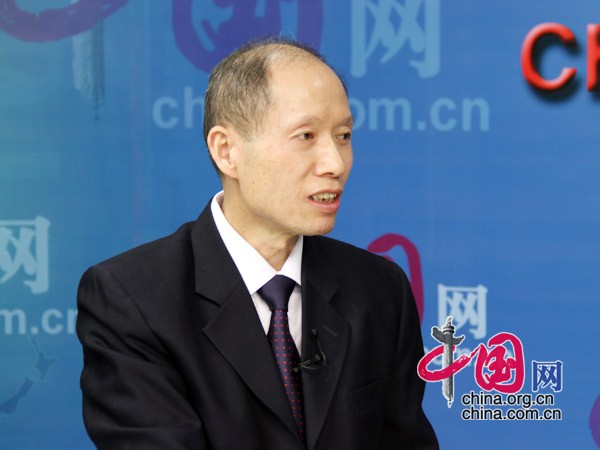Japan nuclear leak 'no risk to health in China'
China.org.cn asked Yu Zhuoping, former head of the Chinese Delegation to International Atomic Energy Agency (IAEA), to share his insights on the Fukushima nuclear disaster and its implications for China's nuclear power program.
|
|
|
Yu Zhuoping, former head of the Chinese Delegation to IAEA. [Zhang Lin / china.org.cn] |
Fukushima leak is no threat to health in China
China.org.cn: Although there has been no nuclear explosion at the Fukushima nuclear power station, nuclear radiation, in the form of radioactive gases, is being spread by the wind. Chinese people are worried their health may be affected.
Yu Zhuoping: The current situation has not affected our country. Follow-up developments remain to be seen. Fukushima is a very long way from China. Even if a south or southeast wind blew radioactive material to China, it would be highly diluted and no longer a threat to us. The composition of the atmosphere is extremely complex. A small number of molecules in the air will not damage people’s health.
China.org.cn: Japan and China are separated by the East China Sea. Could the sea carry radioactive pollutants to China?
Yu Zhuoping: Even if radioactive elements reached here, I think they would be highly diluted after such a long journey and would not be a threat to people’s health.
China’s nuclear plants are safe
China.org.cn: What about the safety of China's own nuclear power plants?
Yu Zhuoping: The measures that China takes regarding its own nuclear safety are very thorough. China has always attached great importance to the safety of nuclear power. All nuclear power plants currently in operation are in good order. All indicators are in accordance with standards. The construction of nuclear power plants is advancing in an orderly manner. The government conducts safety checks at existing nuclear facilities and those under construction. I think the decision-making is very wise and timely, in line with the old saying, ‘Even when the sun is shining, don't leave your coat at home’.
Nuclear plants best located near the coast
China.org.cn: Most of China's nuclear power plants are located in eastern coastal cities with high population densities. Are there plans to build more nuclear power plants in the western region of the country?
Yu Zhuoping: It depends on the departments responsible for national nuclear security. Personally, I think most of our nuclear power plants should be located in the coastal regions. Take the Japan nuclear crisis, for example; although radioactive material is leaking, the west wind is blowing it towards the Pacific Ocean. The situation would be much graver if the plant had been built inland. In this case, no matter which direction the wind blew, radioactive material would spread inside the country. The decision-making process is expected to be complicated and will require the country's leaders to balance the need for power and environmental factors.
Nuclear power a clean energy source
Nuclear power development should not be halted on account of this single Fukushima power plant accident. Most countries need nuclear power, as it is a source of clean energy. All the new technologies have risks. For example cars are convenient, but driving a car has risks attached. Nuclear power plants are the same. It is a very good form of power supply. But it carries certain risks. Nuclear power plants discharge radioactive material into the environment every day. This is quite normal and the amount is too small to affect our lives. It is neither scientific nor realistic to demand something to be 100 percent safe. We can't duck the question. But we can reduce the risk to an acceptable level.
Right now I think that nuclear power is a very good and safe source of energy. Taking into account both its impact on the environment and its convenience, I think nuclear power development should be encouraged.
 0
0 








Go to Forum >>0 Comments